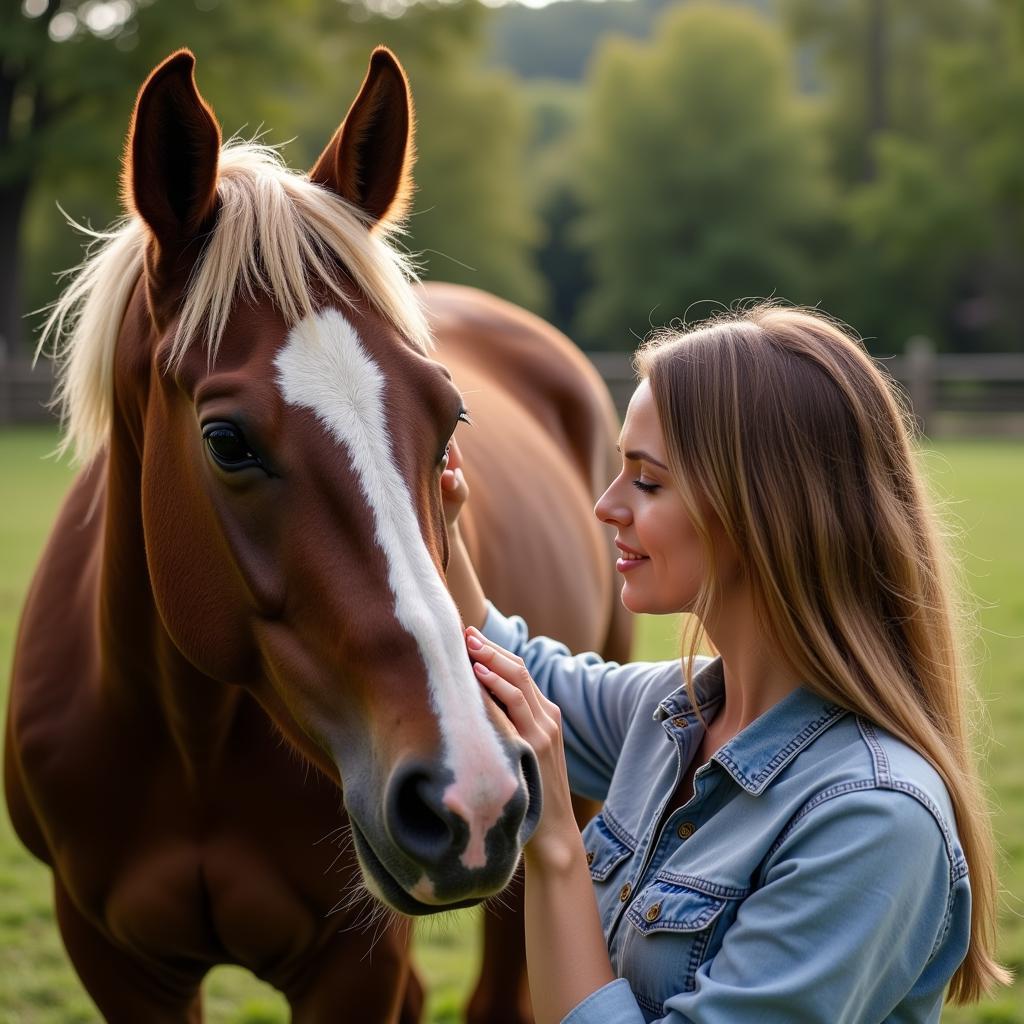The search term “Horse Making Love To A Lady” often arises from curiosity or misinformation. This article will explore the biological and behavioral realities surrounding horses and human interaction, debunking myths and providing accurate information. We’ll delve into horse behavior, safe interactions with horses, and the importance of responsible animal handling.
Decoding “Horse Making Love to a Lady”: Addressing the Misconception
The idea of a horse “making love” to a lady anthropomorphizes horse behavior. Horses are driven by instinct and biological needs, not human-like emotions or romantic intentions. Their interactions are based on herd dynamics, survival, and reproduction within their own species. While horses can form strong bonds with humans, these bonds are built on trust and mutual respect, not sexual attraction.
The Biological Impossibility
Biologically, horses and humans are incompatible for sexual reproduction. Their reproductive systems are vastly different, making interspecies mating impossible. Attributing human emotions and sexual behaviors to horses is a fundamental misunderstanding of their nature.
Horse Behavior and Human Interaction
Horses communicate through a complex system of body language, vocalizations, and scent. Understanding these signals is crucial for safe and positive interactions. Horses express affection through gentle nudges, soft nickers, and mutual grooming. These behaviors, however, are displays of social bonding within their herd structure, not romantic gestures towards humans.
Building Trust and Respect
Building a strong bond with a horse requires patience, understanding, and clear communication. Horses respond to consistent, calm, and assertive leadership. Respecting their boundaries, learning their individual personalities, and providing a safe and enriching environment are essential for fostering a positive relationship.
 Building Trust and Respect Between Horse and Human
Building Trust and Respect Between Horse and Human
The Dangers of Misinterpreting Horse Behavior
Misinterpreting horse behavior can lead to dangerous situations for both humans and horses. Projecting human emotions and intentions onto horses can create unrealistic expectations and lead to miscommunication. This can result in accidents, injuries, and a breakdown of trust.
Promoting Responsible Animal Handling
Responsible animal handling involves understanding and respecting the natural behaviors and instincts of animals. Educating ourselves about horse behavior, seeking guidance from experienced horse professionals, and prioritizing safety are crucial for ensuring positive and ethical interactions. This includes understanding the power and size of horses and recognizing their potential to react unpredictably.
The Importance of Accurate Information
The spread of misinformation about horse behavior can perpetuate harmful myths and misconceptions. It’s essential to rely on credible sources of information, such as equine veterinarians, experienced horse trainers, and reputable animal welfare organizations, to understand horse behavior and promote responsible interactions. Sharing accurate information helps foster respect for these magnificent animals and ensures their well-being.
Protecting Horses from Exploitation
By understanding the true nature of horse behavior, we can better protect them from exploitation and mistreatment. Accurate information empowers us to advocate for their welfare and ensure they are treated with the respect and care they deserve.
In conclusion, the concept of a “horse making love to a lady” is a misconception rooted in anthropomorphism. Understanding horse behavior, promoting responsible animal handling, and relying on accurate information are crucial for fostering positive and respectful interactions with these magnificent creatures. Let’s continue to learn about horses and advocate for their well-being. Remember, the search term “horse making love to a lady” reflects a misunderstanding, and it’s our responsibility to seek accurate information and promote responsible animal handling.
FAQ
- Can horses form bonds with humans? Yes, horses can form strong bonds with humans based on trust and mutual respect.
- How do horses communicate? Horses communicate through body language, vocalizations, and scent.
- What are signs of affection in horses? Gentle nudges, soft nickers, and mutual grooming are signs of social bonding in horses.
- Why is responsible animal handling important? Responsible handling ensures the safety and well-being of both humans and animals.
- Where can I find accurate information about horse behavior? Equine veterinarians, experienced horse trainers, and reputable animal welfare organizations are credible sources of information.
- Is it safe to project human emotions onto horses? No, projecting human emotions onto horses can lead to misinterpretations and dangerous situations.
- How can I learn more about horse behavior? Observe horses in their natural environment, take lessons from experienced professionals, and consult reputable educational resources.
What are some common situations that prompt questions like the one addressed in this article? Often, exposure to misleading content or a lack of understanding about animal behavior can lead to these inquiries. Exploring other resources on horse care and behavior can provide a more comprehensive understanding of these magnificent animals. For further information, check out our other articles on Justus Horses USA.
When you need support, please contact us: Phone Number: 0772127271, Email: [email protected] Or visit our address: QGM2+WX2, Vị Trung, Vị Thuỷ, Hậu Giang, Việt Nam. We have a 24/7 customer service team.